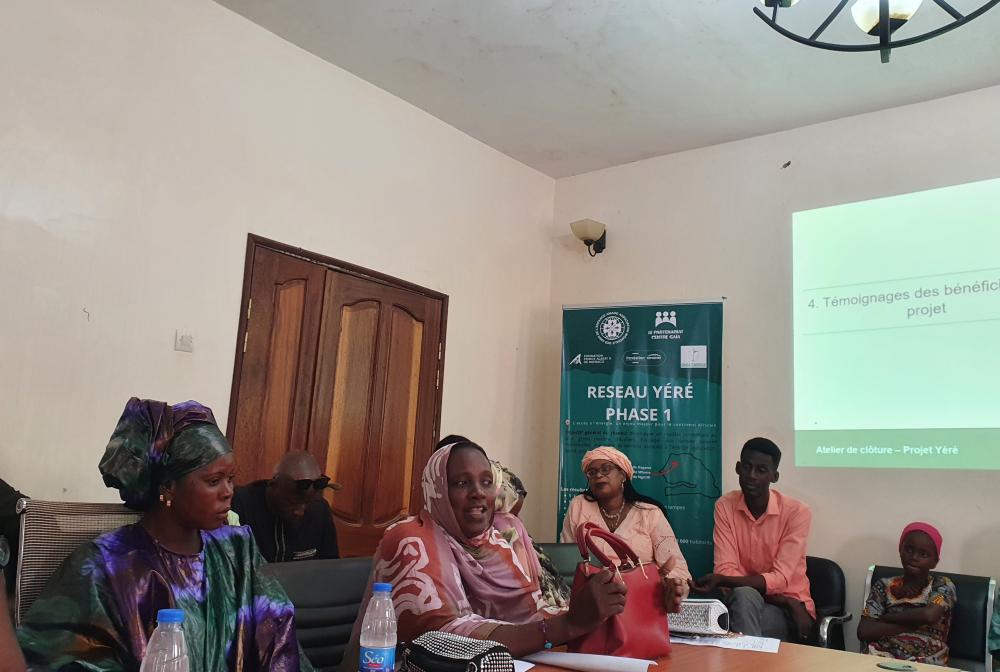Phase 1 of the Yéré project, led by AMADE in partnership with Le Partenariat, aimed to develop a model enabling schoolchildren to access individual solar lamps and essential energy-related services, including education, health and protection. This pilot project was successfully deployed, creating a last-mile distribution network that not only improved children's access to clean, affordable, quality energy, but also contributed to digital inclusion in rural areas.
Aligned with the Sustainable Development Goals (SDGs), in particular SDG 7 on access to sustainable energy and SDG 4 on quality education, the project reflects AMADE's commitment to the protection and development of children, as defined in the International Convention on the Rights of the Child.
AMADE field mission: closure of phase 1 and inauguration of kiosk
As part of this dynamic, an AMADE field mission visited the site to mark the official closure of phase 1 of the project and to inaugurate the first kiosk providing access to energy goods and services for local populations in Niassanté, with a computer room dedicated to local pupils. The kiosk, equipped with digital content such as the Nomad Education application, is part of the project's drive to provide students with enhanced education thanks to modern, accessible tools that help bridge the digital divide in rural areas.
The Yéré network is also run by women entrepreneurs, with a kiosk operator managing network deployment and predominantly female community relays, who play a key role in managing charging stations and promoting energy goods and services linked to education, child protection and health.
AMADE's team also took advantage of this mission to meet with local partners, exchange views on the successes of the first phase, and above all to make progress in the crucial discussions on the sustainability of the Yéré network. These meetings helped reinforce local ownership of the project, a key element in ensuring the sustainability of services beyond external support.
Support from financial and institutional partners
The success of the Yéré project also relies on the support of major financial partners, notably the Prince Albert II of Monaco Foundation and the Engie Foundation. The latter sent a delegation from Energy Assistance on the closing and inauguration mission. This delegation participated in the events and conducted field visits to schools supported by the network's initiatives to assess energy and educational needs and identify solutions to enhance the project's impact in rural communities.
Future prospects with phase 2 of the Yéré project
Building on these achievements, phase 2 of the Yéré project is a continuation of the efforts already made. The aim is to consolidate and extend the successes of phase 1, by reaching a greater number of beneficiaries in the Saint-Louis and Matam regions, areas particularly affected by energy and digital poverty. As these areas are not included in national electrification plans for the next five years, the Yéré project offers a sustainable, replicable solution that meets the real needs of rural communities.
The project will continue to rely on a participatory approach, building local capacity and involving all stakeholders to ensure autonomous management of the network. In addition, the extension of the kiosks and the introduction of innovative technologies will further improve access to education and energy, thus contributing to the achievement of MDGs 4 and 7 in the most isolated rural areas.
During the workshops organized during the closing mission, fruitful exchanges took place with local partners and representatives of civil society organizations (CSOs). These discussions highlighted important needs, particularly in terms of raising awareness of civil status and menstrual hygiene, two themes crucial to children's well-being. Participants stressed the importance of ensuring that every student has the necessary civil status documents to continue their schooling, as well as better informing and equipping young girls to face the challenges of menstrual hygiene, a factor often at the root of school absenteeism. These themes, essential to guaranteeing inclusive education and combating school drop-out, will be integrated into the activities of phase 2 of the Yéré network.
By addressing these concerns, the project aims to have an even greater impact on school retention, while strengthening the framework for child protection and development in rural areas.
Conclusion
AMADE's mission in the field, with the support of its partners, marks a milestone in the history of the Yéré project. By closing a successful pilot phase and laying the foundations for sustainable expansion in phase 2, AMADE continues to demonstrate that local initiatives, supported by strategic partnerships, can transform the living conditions of children in rural Senegal. Thanks to clean energy and greater access to digital education, the future looks brighter for children in Dagana, Saint-Louis and Matam.
 L'Amade
L'Amade